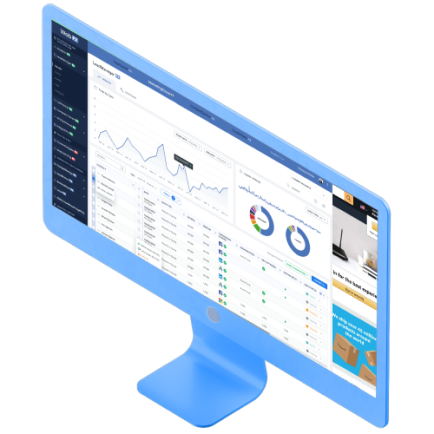-
 Published: Jul 22, 2023
Published: Jul 22, 2023
-
 6 min. read
6 min. read
-
 Matthew Gibbons
Matthew Gibbons Lead Data & Tech Writer
Lead Data & Tech Writer
- Matthew is a marketing expert focusing on the SEO & martech spaces. He has written over 500 marketing guides and video scripts for the WebFX YouTube channel. When he’s not striving to put out some fresh blog posts and articles, he’s usually fueling his Tolkien obsession or working on miscellaneous creative projects.
What is revenue intelligence? Revenue intelligence is the process of gathering and analyzing data about your sales and product usage to drive more revenue.
If you ask any company what its main goal is, the honest answer is, “to earn revenue.” That likely goes for your business as well. Naturally, your business is always looking for more ways to increase its bottom line.
But how do you do that? How do you figure out the most effective ways of driving up your earnings?
The answer is revenue intelligence. This marketing and sales process is the key to learning how you can drive more sales and improve your company’s revenue. But what is revenue intelligence, and how can it benefit you?
That’s just the question we’re here to answer, so keep reading to learn more. Then subscribe to our newsletter, Revenue Weekly, for more digital marketing tips from the experts!
Join 200,000 smart marketers and get the month’s hottest marketing news and insights delivered straight to your inbox! “*” indicates required fields (Don’t worry, we’ll never share your information!)Don’t miss our Marketing Manager Insider emails!
Enter your email below:
Inline Subscription Form – CTA 72

What is revenue intelligence?
Revenue intelligence is a process that involves gathering, organizing, and analyzing data about your sales and product usage for the purpose of learning how you can drive more revenue for your business. Typically, this process is enhanced by artificial intelligence (AI) tools.
How does revenue intelligence work?
Now that we’ve defined revenue intelligence, let’s break down that definition a bit. How exactly does revenue intelligence work?
The goal of a revenue intelligence strategy is to help you discover how to drive more revenue in the future. You should ask questions like:
- What’s driven the most revenue for your business previously?
- Which products or services sell the best?
- Which types of people are the most likely to buy from you?
- Which marketing and sales strategies generated the most revenue?
That’s where revenue intelligence enters the picture. To answer those questions, you can look back at your marketing and sales data. By unifying that data and analyzing it, you can find trends and patterns that will show you which strategies and practices are the most effective at driving revenue.
Then you can take what you learn and apply it to your marketing and sales going forward.
4 benefits of revenue intelligence
There are several significant ways that revenue analytics can help your business. Here are four of the biggest things that it can help you accomplish.
1. Identify viable opportunities
One advantage of revenue intelligence is finding marketing and sales opportunities that you may not have previously been aware of.
For example, maybe your primary focus has always been on targeting people in Kansas. But when you analyze your revenue data, you find that your most successful sales have come from people in Nebraska. That tells you that there’s a big opportunity to boost your revenue by investing more in marketing to Nebraska residents.
Similarly, you might find that a particular marketing strategy worked well for you, but it hasn’t been your priority in the past. By relying more on that strategy in the future, you can potentially increase your revenue even further.
2. Unify your team
Another significant benefit of revenue intelligence is that it can help you get your entire team on the same page. One result that can often happen with marketing and sales teams is that different team members will end up working with data from different sources, and that data will often be inconsistent.
But revenue intelligence involves unifying all your data in a single location. That prevents any inconsistencies, and it also prevents data silos — that is, situations where different teams operate on separate datasets that they don’t share with one another.
When all your team members are in sync with one another, their marketing and sales efforts will be more effective.
3. Increase your understanding of your audience
One of the most crucial parts of marketing and sales is understanding your audience. If you don’t even know whom you’re marketing to — much less what they want and how to convert them — you won’t have much luck driving sales.
Thankfully, revenue intelligence can help with that. Your analytics can show you exactly what sorts of people are buying from you and what they want from your company. That can range from customer demographics to the way people interact with your website and online marketing.
By increasing your familiarity with your audience, you’ll be able to more effectively market and sell to them, boosting your revenue.
4. Improve your conversion rate
Finally — and most importantly — revenue analytics helps you improve your conversion rate.
This benefit is a result of the previous three. By identifying new opportunities, getting your team on the same page, and getting a better understanding of whom to target and how to target them, you can vastly improve your marketing and sales efforts.
Consequently, those efforts will be much more effective at driving conversions. Those conversions include everything from email signups to sales. In the long run, those increased conversions will help your business generate far more revenue — which is, of course, the endgame.
Choosing the best revenue intelligence tool
Revenue intelligence isn’t something you can do totally on your own. You’ll need to have some digital software in your toolbox.
One option is to go seek out some software designed specifically for revenue intelligence. There are several different revenue intelligence tools out there, including:
- Gong
- Revenue.io
- Chorus
However, these tools aren’t necessary for everyone. They can be useful if you can afford them, but they’re not the only tools that can do the job. After all, revenue intelligence is all about gathering data about your sales, customers, and product usage — and there are other types of tools that do that.
If you’re like most businesses, you’ll already need to have a customer relationship management (CRM) platform, and possibly some marketing software as well. These tools often have all the necessary features for performing revenue intelligence, in which case there’s no need to go spend money on an additional platform.
One platform tracking countless metrics and driving stellar results.Meet MarketingCloudFX:


MarketingCloudFX can boost your company’s revenue intelligence efforts
If you’re looking for some marketing software to help you with your revenue intelligence strategy, look no further. MarketingCloudFX is WebFX’s proprietary marketing software, designed for businesses just like yours. It can help you gather and analyze data about your marketing campaigns.
Plus, when you use MarketingCloudFX, you get free seats in Nutshell, one of the best CRMs on the market. Together, the two platforms can help you form a holistic view of your sales, customers, and overall revenue analytics. You can then apply your insights to drive more sales down the road.
Interested in partnering with us to use MarketingCloudFX? Just give us a call at 888-601-5359 or contact us online today!
-
 Matthew is a marketing expert focusing on the SEO & martech spaces. He has written over 500 marketing guides and video scripts for the WebFX YouTube channel. When he’s not striving to put out some fresh blog posts and articles, he’s usually fueling his Tolkien obsession or working on miscellaneous creative projects.
Matthew is a marketing expert focusing on the SEO & martech spaces. He has written over 500 marketing guides and video scripts for the WebFX YouTube channel. When he’s not striving to put out some fresh blog posts and articles, he’s usually fueling his Tolkien obsession or working on miscellaneous creative projects. -

WebFX is a full-service marketing agency with 1,100+ client reviews and a 4.9-star rating on Clutch! Find out how our expert team and revenue-accelerating tech can drive results for you! Learn more
Try our free Marketing Calculator
Craft a tailored online marketing strategy! Utilize our free Internet marketing calculator for a custom plan based on your location, reach, timeframe, and budget.
Plan Your Marketing Budget

Maximize Your Marketing ROI
Claim your free eBook packed with proven strategies to boost your marketing efforts.
Get the GuideTry our free Marketing Calculator
Craft a tailored online marketing strategy! Utilize our free Internet marketing calculator for a custom plan based on your location, reach, timeframe, and budget.
Plan Your Marketing Budget





